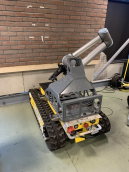
Master projects
HVL Robotics has a number of master project proposals available within human-robot cooperation, soft robots, mobile robots and robot manipulator arms. Many projecs are given with an external company as a client or sponsor for the project. Do not hesitate to get in touch if you are curious about a master project in robotics not listed - we very much welcome new ideas to exiting projects!
Master project proposals in Robotics:
Master projects proposals in Human-Robot Cooperation, Soft robots, Mobile robots and Robot manipulator arms, and master projects linked to industry partners and ongoing research project will be published continously at this page:
- Navigation and autonomy for mobile robots for raspberry production [industry partner][ongoing research project][FutuRaPS]
- Adaptive robot arm motion planning for spraying raspberry plants [industry partner][ongoing project][FutuRaPS]
- Pilot Study for Assessing Raspberry Plant Health Using Hyperspectral Imaging and Machine Learning [ongoing project][FutuRaPS]
- Smart grasping for generic 2-finger grippers
- Human-motion estimation using wearable sensors (IMUs) and cameras [ongoing project]
- Robot learning for human-robot cooperation [ongoing research project][Teknoløft]
- Robotic handling of reusable surgical equipment [industry partner][ongoing project][industry partner]
- Robotic identification and handling of flexible textiles for cleaning [ongoing project][industry partner]
- Robots for inspection and maintenance of the CERN particle accelerator [international stay]
- Human-Robot Cooperation, Soft robots, Mobile robots and Robot arms - a range of different projects [ongoing projects]
More topics to be published - contact us if interested
Master project details
More details on the different proposed master projects:
1. FutuRaPS: Enabling autonomous navigation for an Alitrak platform in challenging environments
The primary objective of this project is to empower the Alitrak platform with autonomous navigation capabilities. This involves augmenting its sensor suite by incorporating Lidar and GPS-RTK technologies. Furthermore, the creation and implementation of a comprehensive ROS-based navigation stack, enabling both local and global navigation, with functionalities such as point-to-point navigation and obstacle avoidance.

2. Adaptive robot arm motion planning for spraying raspberry plants
Planning adaptive robot arm motions to follow the outline of raspberry plants to spray plants for deceases. This is part of the FutuRaPS project.
3. Pilot Study for Assessing Raspberry Plant Health Using Hyperspectral Imaging and Machine Learning
In modern agricultural practices, monitoring plant health is crucial for optimizing yield and quality. Plants are sensitive to various diseases that can significantly impact their productivity. This project aims to explore using hyperspectral imaging and machine learning (ML) techniques to assess plant health efficiently and conduct the first pilot study on this at Nibio. An available hyperspectral camera will be used to capture detailed spectral data from the plants, enabling us to identify potential diseases based on their reflectance characteristics. This is part of the FutuRaPS project.
4. Smart grasping for generic 2-finger grippers
Traditional grasping algorithms are typically hard-coded and tedious, consuming significant time and effort on top of the precise programming of the robot itself. To address this, the "Smart Grasping Algorithm for Generic 2-Finger Grippers" project aims to develop a smart, learning-based algorithm for generic purposes. This advanced algorithm will enable robots equipped with cameras and attached 2-finger grippers to determine the optimal way to grasp objects of varying shapes and sizes without the need for manual programming and fine-tuning.
5. Robot learning for human-robot cooperation
[ongoing research project]
Multiple project proposals possible - either linked to building small robot arms or mobile robots that can learn new behaviour (either through reinforcement learning or through human demonstrations). Contact us to discuss.
6. Human-motion estimation using wearable sensors (IMUs) and cameras
[ongoing research project]
Multiple directions possible with main goal to create a reliable low-cost human motion estimation system that can both be used to cooperate with robot arms, or to measure human motions linked the health applications (such as rehabilitation after stroke). Get in touch to discuss.
7. Robotic handling of reusable surgical equipment
Three different directions are possible within the project:
- 3D instrument and position classification of reusable surgical equipment (RSE)
- The goal is to classify types of RSE visible in a cluttered bin, identify one or more top candidates for picking, and find the 3D position of the top candidate(s). Available 3D imaging technologies for random bin-picking of highly reflective objects will be explored (stereographic, time-of-flight, structured light).
- Bin picking reusable surgical equipment (RSE)
- The goal is to enable grasping of the different types of RSE in a cluttered environment with possible overlap between objects.
- Washing reusable surgical equipment using robotics (RSE)
- The goal is to create a pre-cleaning system with minimal maintenance requirements and little wear and tear on RSEs. Exploring soft mechanical brushes, chemical agents, compressed air and combinations of these as possibilities.
8. Robotic identification and handling of textiles for cleaning
The project can take different directions. One possibility is to develop a system that classifies a textile garment (coat, trouser, etc.) and selects a grasping point to grip, and move/sort the textile to a pick-up point/sorting bin. An extension on this is to manipulate the textile to read off an ID-tag (RFID) to uniquely identify the textile.
9. Robots for inspection and maintenance of the CERN particle accelerator
The particle accelerator at CERN develops their own inspection and maintenance robots to service the large 27-km accelerator 100m under ground, and invites students to help develop robots to solve a wide range of different challenges. Typically, the master project would have 6 months in Norway for development etc., and then a 6-month stay at CERN to implement the robot system in the field. Financial support is available for this international stay.
